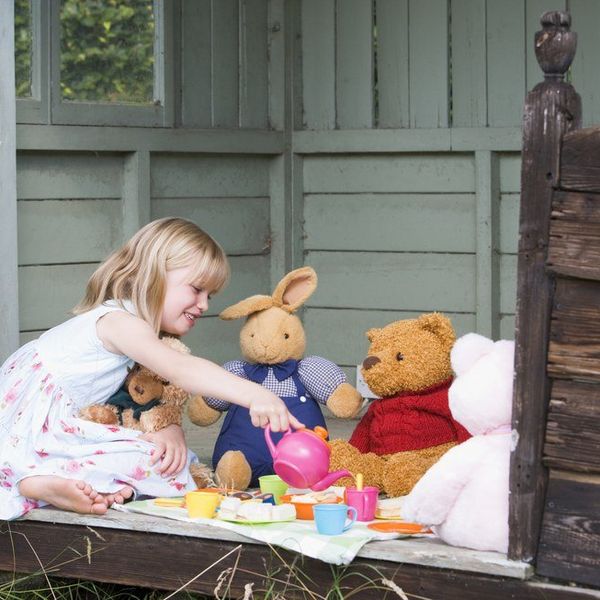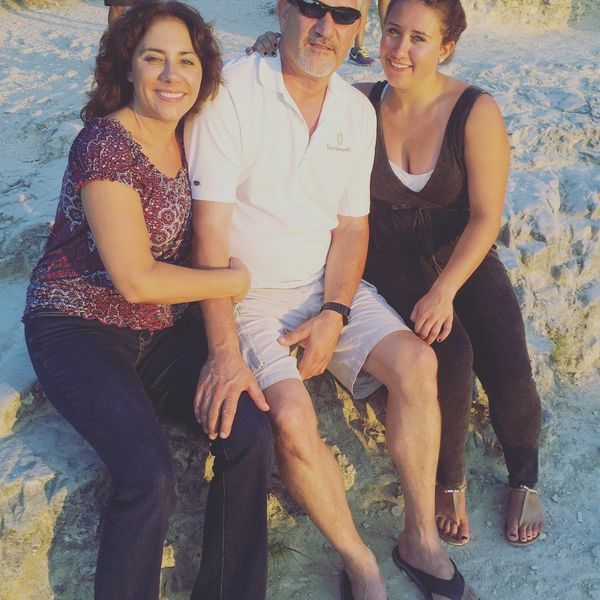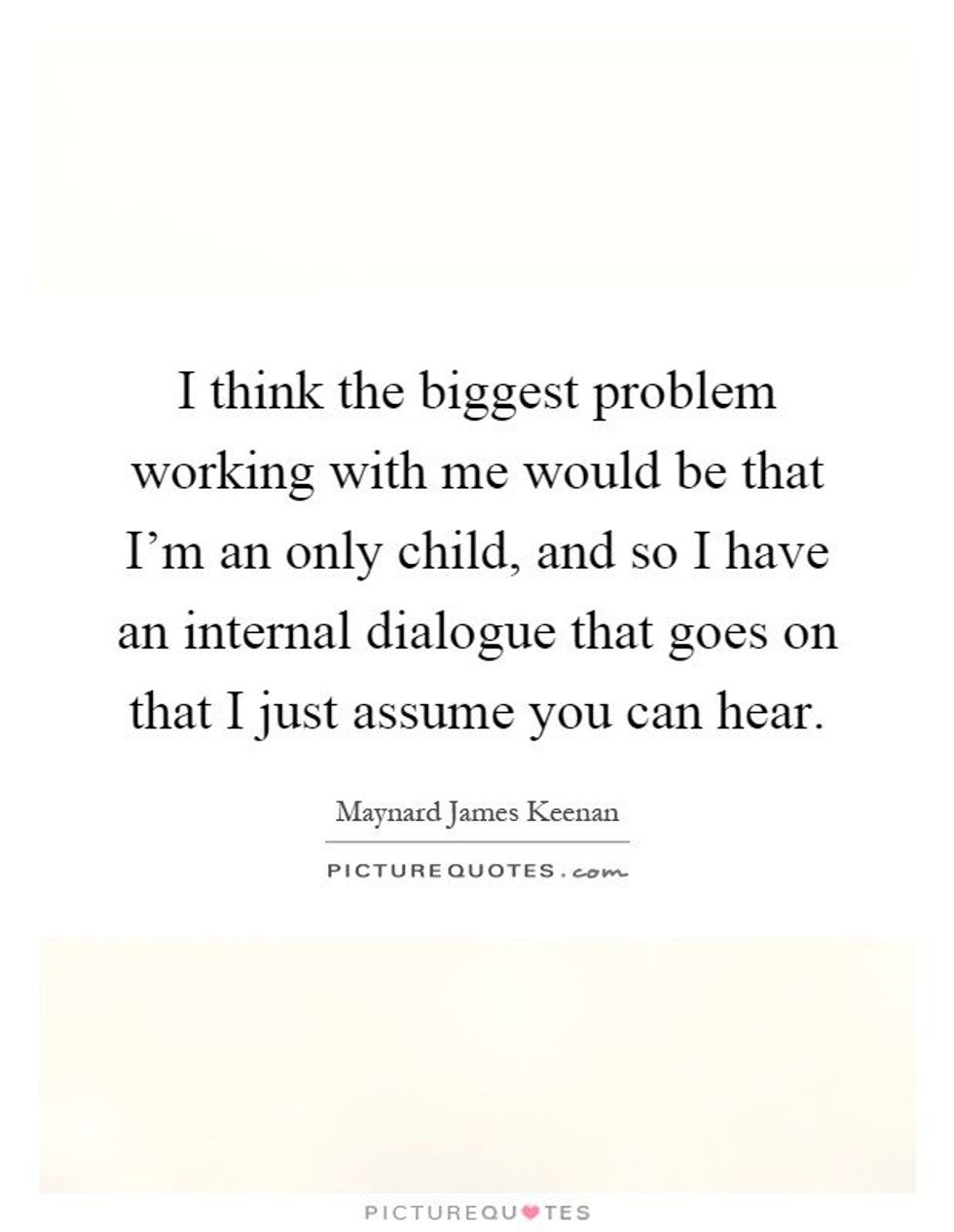1. We know how to entertain ourselves
Growing up alone meant that unless I had a play-date or a sleepover with someone else, I was not going to be around anybody my age (school excluded). So I had to get pretty good at entertaining myself. This meant figuring out games that I could play on my own, like computer games, watching cartoons, or reading/drawing/wandering around in the backyard alone.
I was pretty creative as a kid, which was a result of becoming a huge book-worm (and is probably why I'm a Creative Writing major in college now). However, I was so into reading that that was my reputation at school. At any given time I had 5-10 books in my locker and would occasionally lend them out to other people in a pinch. If my school district had had a huge book ban list, I would have been the kid who had all the books in my locker or my backpack and would have totally lent them to other people to read (I know--what a rebel I could have been).
2. We're okay with spending time alone
Being an only child means you never really realized that other people didn't get much only time. After all, it's just us and our parent(s) living in one house. As a result, we usually have to resort to getting some special interests. By that I mean that at one point in our childhood, we figured out that in order to entertain ourselves constantly, we would have to do half of it on our own.
As much fun as adult family members and friends were, they were never going to be around us 24/7. So we all had to figure out what was endlessly entertaining, whether that meant drawing, arts and crafts, reading, making up gymnastics routines at home, and so. I've noticed that as most of us get older, we're still okay with spending (lots of) time on our own. It's what we're used to, and by now we have an arsenal of options to stave off boredom and/or idleness.
3. We are drawn to friends who have large families
Honestly, it's fascinating to see people who have large families. I know one family where the parents have 7-8 kids (who are all extremely lovely, by the way). You get so many questions just seeing them: Do y'all have to share rooms? Do you get any alone/downtime? What happens when you can drive? Does that mean older siblings have to drive the younger siblings places? What about when someone goes into your space and "borrows" one of your shirts? Are all of you into the same things or does everybody have diverse interests? Do you want a big family?--and on and on and on.
There are really only two solutions: outright ask, or become friends with them and silently observe them interact with each other until your questions are asked (after the three month mark of friendship, I think you're allowed to start verbally asking more questions).
Being around big families also fulfills a secret desire to interact with or be part of a big family, even if it's just for a short amount of time. People who have big families are the polar-opposite of our living situation, after all-- it's interesting to see how they interact with the rest of the world as opposed to how we do.
4. We're used to having friends who are older
Usually, being an only child means that we mature faster then other people. As a result, we choose friends who are older then us. They're like us mentally. This happens because we're always around adults. Being an only child means that, as I've said, you only see friends at school or after school at a planned activity. You don't have siblings to play with (or fight with), so you either make do with entertaining yourself or interacting with the adults who are around you. This means that we get influenced a lot by older family members, for example, and we mature mentally more quickly.
However, there are the exceptions: most only children aren't spoiled, but there are some. Spoiled only children are the ones who are extremely demanding, self-centered, and immature.
5. We need a lot of personal space
I've noticed that a lot (maybe not all) only children are also introverts. We need time to decompress and not be around people, because that's not what we're used to. Yes, we can be flexible and be around others, but eventually we need to leave so that we don't have to be so "on", if that makes sense. It's nice to come back to our designated space and not interact with anybody.
6. We treat our friends like they're our family
Hey, it's what happens when you're an only child. You get emotionally intense with your friends because they're people you can get close to. It's not like we have siblings to spend a whole load of time with growing up.
7. We pretended at one point that we had a sibling
Having a sibling is like a foreign concept to us, but it sure is interesting. I mean, what's it really like to have to share a house with someone around your age who's related to you? When I was younger, I thought it meant that you just had a lot of built-in playmates, which was THE BOMB. However, as I was an only child, I had no siblings. I was very jealous of people who weren't only children because it sounded very interesting to have an older sibling or two (back then I resented the idea of having younger siblings. They sounded very bratty). Solution: build my own sibling out of my imagination (to my now eternal shame)! I always imagined that I had an older brother named Nick who was very cool and very athletic. The only reason why I thought he would be a good brother is because he would buy me a lot of books.
8. We got "the talk", and then "The Talk"
Being an only child means that at some point, one of your parents is going to sit you down and tell you why you're an only kid in a country where having siblings is pretty common. This also means that when you have The Talk about sex and puberty, it's going to be awkward and weird. I mean, we haven't had older siblings to break the news about this stuff to us (or give us misinformation about it).
9. We don't have anybody else to blame if we get into trouble
Seriously. It's just us. We can't even blame the dog or the cat about the messy room we have or why we're getting home so late. This means that you end up either not getting into much trouble, or figuring out how to not get caught--not that I endorse doing bad things. I know we all make mistakes, but eventually you have to grow up and make less--in public, anyway.
(I'm kidding. It's good to grow and learn from your mishaps).
10. We're not used to sharing. At all.
This gets more pronounced when we go to college. Being a roommate with someone was a completely new experience for me. What do you mean I have to share this cramped and not air-conditioned room with someone else for the entire year? On a Mild to Severely Awful Sharing scale, we're not that great at sharing our things. Growing up, we never had to. Everything we owned was purely ours-- we never had to worry about another pesky sibling not respecting boundaries and taking what was rightfully ours. So, it takes us time to figure out how to do that with other people when we're put into that situation.
11. We feel like we owe something to our parents
Being an only child means that you're capable of being a successful human being or a potato. None of us want to disappoint our parent(s) or our family, so we have to prove that we can be successful, happy adults. We're pretty much expected to be well-rounded, intelligent people. There aren't any siblings to outshine us, so we have to be the brightest star in the room for our parent(s). I mean, none of us want to see a disappointed look when we see family members.
For me, on the other hand, it's a combination of not wanting to disappoint them, and not wanting to disappoint myself. I've had some times in high school, and I don't want to ever be in those situations again. The only option is to have a strong work drive and really go after what I want in life.




















